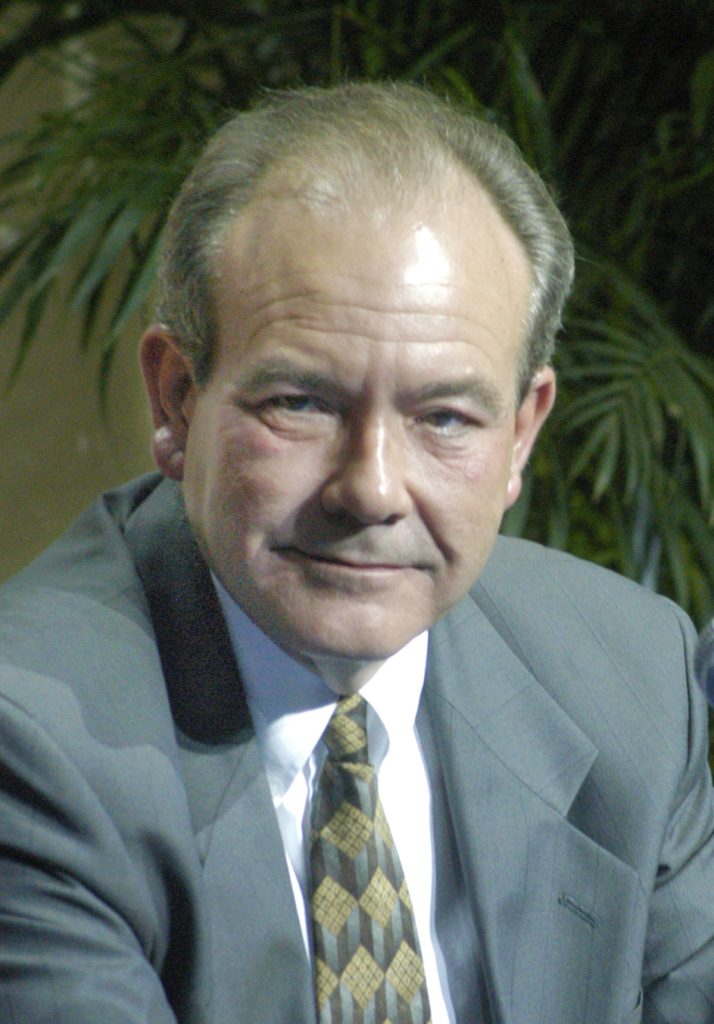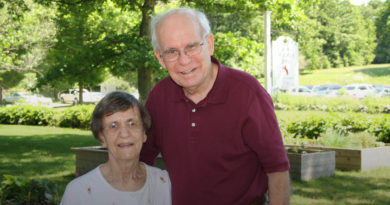Beloved Film Professor Succumbs To Cancer

Former students and colleagues of associate professor of film Mario Beguiristain say they miss his soothing voice and the sight of his eyes lighting up as he talked about a film. After spending six weeks at the Baptist Hospital of Miami due to stage four pancreatic cancer, Beguiristain passed away at the age of 68 on Sept. 10 at 12:26 p.m.
He retired from the School of Entertainment and Design Technology (SEDT) at North Campus in February of 2015 after serving as a full-time film professor for almost 12 years.
“Mario will be remembered as someone who inspires students and faculty because of the amount of [knowledge he had],” said Agustin Gonzalez, a film professor at North Campus. “He was very generous with his knowledge and he was just a very funny person. In the film school we have this circle with all the professor offices and we would always laugh and learn with him. He made us all better.”
Before entering Miami Dade College, Beguiristain had 30 years of expertise in the film and marketing industries, having produced and directed an array of films, TV commercials and programs. He also contributed to movies like Scarface. Al Pacino, Andy Garcia, Cantinflas and Celia Cruz are just a few of the stars he collaborated with.
His passion for filmmaking first manifested in his childhood as he drew movie theater designs and performed plays with his younger brother and sister.
Originally from Matanzas, Cuba, Beguiristain moved to the U.S. in 1963 and attended Hialeah High School for less than a year while working at tomato farms on the weekends. After moving to Atlanta, Georgia, Beguiristain graduated from O’Keefe High School in 1966 with several recognitions and the highest SAT score in his class.
He studied architecture at the Georgia Institute of Technology for a year and left to study film at New York University. Because his parents believed that filmmaking was not a proper career, he transferred to the University of South Carolina and earned his bachelor’s in French and Spanish comparative literature.
It wasn’t until 1970, when he moved to Los Angeles to break into the motion picture industry, that Beguiristain started pursuing his true vocation. He obtained his master’s in film education and Ph.D. in cinema communication from the prestigious University of Southern California film school in 1975 and 1978, respectively.
He spent 24 years in California, where he first worked as an assistant cameraman and later as a TV producer for NBC. He was also a freelance writer, director for industrial films, and a script consultant for Richard Lester’s Cuba and Sydney Pollack’s Havana. Beguiristain had an interest in Cuban history and culture throughout his lifetime.
As Al Pacino’s dialect coach for the movie Scarface (1983), he was given the task of teaching him how to speak and act Cuban. He was later fired by Oliver Stone, the script writer, for changing up the script to more accurately represent the Cuban dialect.
Beguiristain was the creative director for KVEA-TV which, with his help, later became Telemundo. Hispanet was the name planned for the station, but with his persuasion, it was named Telemundo to appeal to the Spanish-speaking audience.
Involved in Hispanic advertising, he worked with clients like Coca-Cola, Disneyland, Toyota and Marshalls, and as the on-air promotions director for the Univision Network. His advertising works earned multiple accolades including a Clio Award, a New York Festival Award, two Golden Mike Awards and two Sunny Awards.
With his vast experience in the artistic and business aspects of filmmaking, he joined the film faculty at SEDT in 2003, teaching courses like history of film, American independent film, film business, visual communication and screenwriting.
“I never heard a student say one negative thing about him,” said Tommy Demos, a film professor at SEDT and a friend of Beguiristain. “He was a very nice man, always smiling, but he had no fear of authority and would say whatever he thought. We saw him as a mentor [and as] a model professor.”
After taking history of film, many of Beguiristain’s students—hooked by his wealth of knowledge, clear and methodical style, and witty personality—continued on to take all of his other classes.
With his in-depth explanations of movies, his students were able to understand even the most complex pieces. He encouraged them to watch and support independent and foreign films at the Miami Beach Cinematheque, the Tower Theater and art house theaters, where they would often run into him.
While at MDC, he helped develop the film bachelor’s degree program and managed the film internship. He engaged in numerous projects outside of the College. In 2003, he developed a theatrical musical biography of Cuban poet/patriot José Martí. From 2004 to 2006, he ran a Telemundo Writers Workshop to train telenovela writers.
He retired when he felt it was the right time, at 66.
“I was sad when he retired, because I thought about all the classes he taught and [about who could] replace him, but nobody can replace Mario,” said Andrea Estrada, a former student. “Then I was really excited for him about this new chapter about retirement, but it’s pretty sad that he didn’t have more time to enjoy…he was like family. When I would tell him what I was working on [after I graduated], he would always cheer me on.”
Following his retirement, Beguiristain taught small film classes to public elementary school students in Miami.
He also traveled to Europe a couple of times and stayed with some friends in France. He had established connections all across the world after dedicating part of his life to visiting various countries like England, the Netherlands and Vietnam.
He never had children nor married.
“He always marched to the beat of his own drum,” said Jose Beguiristain, his younger brother. “He was more of a bohemian, not the average 9-to-5 guy…[and] enjoyed get togethers and to spend time with family and friends. He was a man of friendships.”
Beguiristain was devoted to his nephews and nieces, as well as his 94-year-old mother whom he visited three times a week.
It wasn’t uncommon for Mario to invite friends and relatives to his cozy South Beach apartment, which he designed to look like a 1950s space age bachelor pad. It was featured in HOME Miami magazine.
He took pleasure in hosting these gatherings and making everyone comfortable. Cooking for his loved ones was also something he enjoyed, especially Hispanic dishes like arroz con pollo.
“It really took us by surprise that he was diagnosed with pancreatic cancer and he was gone so soon after that,” said Diana Chia, Beguiristain’s younger sister. “He will be missed by all his friends and family. He was just so fun to be around.”
He started experiencing stomach aches around late June. Initially, the doctors couldn’t figure out what he had. After his brother took him to the emergency room on July 30, he was hospitalized and given medication to alleviate his severe pain. Three weeks before he died he was diagnosed with pancreatic cancer at stage four, the terminal stage.
Many friends, students, colleagues and family members visited him at the hospital, not knowing it was their last goodbye.
The day before he died, he said “the movie is good” to two friends who had flown from California to see him, referring to his fulfilled life in a peaceful and happy tone.
His last wishes were to be cremated and have his ashes spread over two coconut trees he planted outside his apartment 14 years ago. According to his sister, he also planned to donate his entire film library to Miami Dade College.
“Movies never die,” said Mark Pulaski, a former student and a freelance filmmaker. “If some of us are lucky enough to continue in what we want to do…to produce our own films, the things that he taught us and brought to our eyes…will forever be in those movies. And some of him will live forever in that.”




